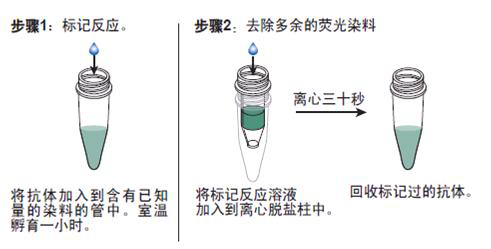
|

| 产地 | 进口、国产 |
| 品牌 | 上海莼试 |
| 保存条件 | Store at -20 °C |
| 货号 | CS11750 |
| 应用范围 | WB=1:100-500 ELISA=1:500-1000 IHC-P=1:100-500 IHC-F=1:100-500 Flow-Cyt=1:100-500 ICC=1:100-500 IF=1:100-500 |
| CAS编号 | |
| 抗体名 | Anti-TRPV3 |
| 克隆性 | |
| 靶点 | 详见说明书 |
| 适应物种 | 详见说明书 |
| 形态 | 详见说明书 |
| 宿主 | 详见说明书 |
| 亚型 | IgG |
| 标识物 | 详见说明书 |
| 浓度 | 1mg/1ml% |
| 免疫原 | KLH conjugated synthetic peptide derived from human TRPV3 |
产品订购信息:
英文名称 Anti-TRPV3
中文名称 辣椒素受体3抗体规格
别 名 1110036I10Rik; MGC124324; MGC124325; Transient receptor potential cation channel subfamily V member 3; TrpV3; Trpv3 heat sensitive channel; TRPV3_HUMAN; Vanilloid receptor 3; Vanilloid receptor like 3; Vanilloid receptor-like 3; vanilloid receptor-related osmotically activated channel protein; VRL 3; VRL-3; VRL3.


浓 度 1mg/1ml
规 格 0.1ml/100μg 0.2ml/200μg
抗体来源 Rabbit
克隆类型 polyclonal
交叉反应 Human, Mouse, Rat, Dog, Pig, Cow, Horse, Sheep
产品类型 一抗
研究领域 细胞生物 神经生物学 通道蛋白 细胞膜受体
蛋白分子量 predicted molecular weight: 91kDa
性 状 Lyophilized or Liquid
免 疫 原 KLH conjugated synthetic peptide derived from human TRPV3
亚 型 IgG
纯化方法 affinity purified by Protein A
储 存 液 Preservative: 15mM Sodium Azide, Constituents: 1% BSA, 0.01M PBS, pH 7.4
辣椒素受体3抗体规格 产品应用 WB=1:100-500 ELISA=1:500-1000 IHC-P=1:100-500 IHC-F=1:100-500 Flow-Cyt=1:100-500 ICC=1:100-500 IF=1:100-500
(石蜡切片需做抗原修复)
not yet tested in other applications.
optimal dilutions/concentrations should be determined by the end user.
保存条件 Store at -20 °C for one year. Avoid repeated freeze/thaw cycles. The lyophilized antibody is stable at room temperature for at least one month and for greater than a year when kept at -20°C. When reconstituted in sterile pH 7.4 0.01M PBS or diluent of antibody the antibody is stable for at least two weeks at 2-4 °C.
Important Note This product as supplied is intended for research use only, not for use in human, therapeutic or diagnostic applications.
产品介绍 Transient receptor potential (TRP) proteins are cation-sensitive channels that modulate a myriad of cellular functions, including temperature sensation and vasoregulation Transcribed from a gene adjacent to VR-1, the thermal-sensitive, capsaicin-insensitive TRPV3 is expressed at warm temperatures; expression increases in response to noxious temperatures. Human TRPV3 is expressed in skin, tongue, dorsal root ganglion, trigeminal ganglion, spinal cord and brain. In addition, TRPV3 is co-expressed in dosal root ganglion neurons with VR-1. TRPV3 associates with VR-1 and may modulate VR-1 activity. The 729 amino acid TRPV5 (ECAC1) protein comprises six transmembrane domains, multiple potential phosphorylation sites, an N-linked glycosylation site and three ankyrin repeat regions. It is abundantly expressed in kidney, jejunum and pancreas, and at lower levels in testis, prostate, placenta, brain, colon and rectum. TRPV5 controls the rate-limiting step of vitamin D3-regulated Ca2+ reabsorption in kidney and intestine; the 5’-flanking region of TRPV5 contains four putative vitamin D3-responsive elements.
Function : Putative receptor-activated non-selective calcium permeant cation channel. It is activated by innocuous (warm) temperatures and shows an increased response at noxious temperatures greater than 39 degrees Celsius. Activation exhibits an outward rectification. May associate with TRPV1 and may modulate its activity.
Subunit : May form a heteromeric channel with TRPV1. Interacts with TRPV1.
Subcellular Location : Membrane; Multi-pass membrane protein.
Tissue Specificity : Abundantly expressed in CNS. Widely expressed at low levels. Detected in dorsal root ganglion (at protein level).
DISEASE : Defects in TRPV3 are the cause of Olmsted syndrome (OLMS) [MIM:614594]. A rare congenital disorder characterized by bilateral mutilating palmoplantar keratoderma and periorificial keratotic plaques with severe itching at all lesions. Diffuse alopecia, constriction of digits, and onychodystrophy have also been reported. Infections and squamous cell carcinomas can arise on the keratotic areas. The digital constriction may progress to autoamputation of fingers and toes.
Similarity : Belongs to the transient receptor (TC 1.A.4) family.
TrpV subfamily. TRPV3 sub-subfamily.
Contains 3 ANK repeats.
Database links : UniProtKB/Swiss-Prot: Q8NET8.2

Anti-phosphor-PAK1+PAK2+PAK3 (pSer141)/FITC 荧光素标记抗磷酸化p21激活激酶1/2/3抗体IgGMulti-class antibodies规格: 0.2ml
Rabbit Anti-pig IgG/Gold 金标记兔抗猪IgG(10nm/15nm)Multi-class antibodies规格: 0.5ml
FosB抗体 Anti-FOSB 0.2ml
Goat Anti-rabbit IgG/Alexa Fluor 488 Alexa Fluor 488标记的羊抗兔IgG 0.1ml
FNDC3A 英文名称: Ⅲ型纤维连接蛋白域蛋白3A抗体 0.2ml
Rhesus antibody Rh phospho-STAT5a(Ser780) 磷酸化信号转导和转录激活因子5a抗体 规格 0.1ml
Rabbit Anti-pig IgG/Gold 金标记兔抗猪IgG(10nm/15nm)Multi-class antibodies规格: 0.5ml
IL-1 Alpha (Interleukin-1 Alpha ) 白介素1α抗原Multi-class antibodies规格: 0.5mg
Anti-F-Actin 纤维状肌动蛋白抗体Multi-class antibodies规格: 0.1ml
Rhesus antibody Rh phospho-CDK5(Tyr15) 磷酸化周期素依赖性激酶5抗体 规格 0.1ml
品名 规格 备注
WDR61 英文名称: WD重复膜蛋白61抗体 0.2ml
DOCK2 英文名称: 细胞质分裂付出蛋白2抗体 0.2ml
Anti-F-Actin 纤维状肌动蛋白抗体Multi-class antibodies规格: 0.1ml
Anti-AFP/FITC 荧光标记鼠抗人甲胎蛋白单克隆抗体IgGMulti-class antibodies规格: 0.2ml
DP-I/DSP(desmoplakin I ) 桥粒斑蛋白1抗原Multi-class antibodies规格: 0.5mg
载脂蛋白H抗体 Anti-ApoH 0.1ml
ZSWIM3 英文名称: ZSWIM3蛋白抗体 0.2ml
DERP6 英文名称: 表皮源性蛋白6抗体 0.2ml
Rhesus antibody Rh phospho-EPH A3+A4+A5 ( Tyr779) 磷酸化内皮细胞受体蛋白酪氨酸激酶A3+A4+A5抗体 规格 0.1ml
DP-I/DSP(desmoplakin I ) 桥粒斑蛋白1抗原Multi-class antibodies规格: 0.5mg
人阿米巴(Amebiasis)ELISA 试剂盒 96T/48T 试剂盒 组装/原装
兔子窖蛋白Caveolin-1(CAV1)免疫试剂盒 Rabbit Caveolin-1,CAV1 ELISA kit
神经母细胞瘤抗体(NB-Ab)ELISA试剂盒 ,英文名: NB-Ab ELISA Kit
Porcineierleukin17,IL-17ELISA试剂盒猪白介素17(IL-17)ELISA试剂盒规格:96T/48T
Humanadvancedglycationendproducts,AGEsELISA试剂盒人晚期糖基化终末产物(AGEs)ELISA试剂盒规格:96T/48T
HumanAi-ypsin,ATELISAKit人抗胰蛋白酶(AT)ELISA试剂盒规格:96T/48T
大鼠水通道蛋白4(AQP-4)ELISA 试剂盒 96T/48T 试剂盒 组装/原装
人同型半胱氨酸(Hcy)免疫试剂盒 Human Homocysteic acid,Hcy ELISA Kit
β-葡萄糖苷酶(β-GC)测试盒 可见分光光度法 50管/24样
RatsolubleP-selectin,sP-selectinELISA试剂盒大鼠可溶性P选择素(sP-selectin)ELISA试剂盒规格:96T/48T
Humankaliureticpeptide,KPELISA试剂盒人肽(KP)ELISA试剂盒规格:96T/48T
HumanNeonatalThyroxine,NN-T4ELISAKit人新生甲状腺素(NN-T4)ELISA试剂盒规格:96T/48T
辣椒素受体3抗体规格 大鼠维生素D2(VD2)ELISA试剂盒 ,英文名: VD2 ELISA Kit
人葡萄糖依赖性释放多肽(GIP)ELISA检测试剂盒HumanGlucosedependeinsulieleasingpolypeptide,GIPELISAKit 96T/48T
仓鼠ELISA试剂盒
CLIAKitforRBP(Humaetinolbindingprotein)ELISAKit人视黄醇结合蛋白规格:48T/96T
石蜡切片糖原高酸希尔(PAS)法染色试剂盒50次
ELISAKitCasp-3人胱天蛋白酶3规格:48T/96T

抗体的生物素化标记实验要点:
1. 辣椒素受体3抗体规格 如在反应混合液中有叠氮钠或游离氨基存在,会抑制标记反应。因此,蛋白质在反应前要对 0.1mol/L碳酸氢钠缓冲液或0.5mol/L硼酸缓冲液充分透析;
2.所用的NHSB及待生物素化蛋白质之间的分子比按蛋白质表面的ε-氨基的密度会有所不同,选择不当则影响标记的效率,应先用几个不同的分子比来筛选最适条件;
3.用NHSB量过量也是不利的,抗原的结合位点可能因此被封闭,导致抗体失活;
4.由于抗体的氨基不易接近可能造成生物素化不足,此时可加入去污剂如 Triton x-100, Tween20等;
5.当游离ε-氨基(赖氨酸残基的氨基)存在于抗体的抗原结合位点时,或位于酶的催化位点时,生物素化会降低或损伤抗体蛋白的结合力或活性;
6.生物素还可能与不同的功能基团,如羰基、氨基、巯基、异咪唑基及苯酚基,也可与糖基共价结合;
7.交联反应后,应充分透析,否则,残余的生物素会对生物素化抗体与亲和素的结合产生竞争作用;
8.在细胞的荧光标记实验中,中和亲和素的本底低,但由于链霉亲和素含有少量正电荷,故对某些细胞可导致高本底。
抗体的鉴定:
1)辣椒素受体3抗体规格 抗体的效价鉴定:不管是用于诊断还是用于,制备抗体的目的都是要求较高效价。不同的抗原制备的抗体,要求的效价不一。鉴定效价的方法很多,包括有试管凝集反应,琼脂扩散试验,酶联免疫吸附试验等。常用的抗原所制备的抗体一般都有约成的鉴定效价的方法,以资比较。如制备抗抗体的效价,一般就采用琼脂扩散试验来鉴定。
2)抗体的特异性鉴定:抗体的特异性是指与相应抗原或近似抗原物质的识别能力。抗体的特异性高,它的识别能力就强。衡量特异性通常以交叉反应率来表示。交叉反应率可用竞争抑制试验测定。以不同浓度抗原和近似抗原分别做竞争抑制曲线,计算各自的结合率,求出各自在IC50时的浓度,并按公式计算交叉反应率。
如果所用抗原浓度IC50浓度为pg/管,而一些近似抗原物质的IC50浓度几乎是无穷大时,表示这一抗血清与其他抗原物质的交叉反应率近似为0,即该血清的特异性较好。
3)抗体亲和力:是指抗体和抗原结合的牢固程度。亲和力的高低是由抗原分子的大小,抗体分子的结合位点与抗原决定簇之间立体构型的合适度决定的。有助于维持抗原抗体复合物稳定的分子间力有氢键,疏水键,侧链相反电荷基因的库仑力,范德华力和空间斥力。亲和力常以亲和常数K表示,K的单位是L/mol。抗体亲和力的测定对抗体的筛选,确定抗体的用途,验证抗体的均一性等均有重要意义。